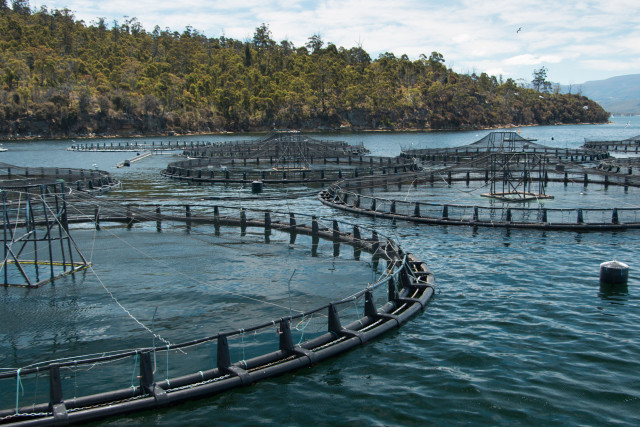Fish Spill: Gov. Inslee Issues ‘Emergency’ Ban on New Pens After Farm Spills Atlantic Salmon into the Pacific

(EnviroNews Washington) — Olympia, Washington — On August 19, 2017, at least several thousand farmed Atlantic salmon (Salmo salar) escaped from a net pen off Cypress Island in Washington’s Puget Sound. In response, Washington Governor Jay Inslee has issued a moratorium, directing the Department of Ecology to put any new permits for salmon farm net pens on hold.
The farm is owned by Canada-based Cooke Aquaculture Pacific, which originally estimated 4,000-5,000 of the pen’s 305,000 fish escaped. Nell Halse, a spokeswoman for the company, has since acknowledged the amount of fish spilled “is a far greater number than the few thousand initially stated by the company,” according to the Seattle Times.
“The release of net pen-raised Atlantic salmon into Washington’s waters has created an emergency situation that has state agencies working together to protect the health of our salmon,” Inslee said in a statement.
Due to concerns that the farmed Atlantic salmon could negatively impact native Pacific salmon, the Washington Department of Fish and Wildlife (WDFW) is now encouraging anglers to catch the escaped fish, with no size or catch limits in place.
“Our first concern, of course, is to protect native fish species. So, we’d like to see as many of these escaped fish caught as possible,” said Ron Warren, head of WDFW’s Fish Program. Warren added that there is no evidence the Atlantic salmon will harm the Pacific salmon through breeding or disease.
There are five species of Pacific salmon in the northern Pacific waters of the U.S. and Canada: coho, Chinook, sockeye, pink and chum salmon. Atlantic, coho, Chinook, sockeye and chum salmon are all listed as either “endangered” or “threatened” by the U.S. Fish and Wildlife Service (USFWS).
In contrast to WDFW’s stance, the Sea Shepherd Conservation Society describes salmon farms as “breeding grounds for disease organisms, which multiply and load surrounding waters with viruses, parasites and bacteria.” This organization is currently monitoring British Columbia’s salmon farms. Spokeswoman Zorianna Kit told the Los Angeles Times that open sores, lice, swollen gills, tumors and deformities have been observed in farmed salmon. Atlantic salmon net pens are banned in California, Oregon, and Alaska.
“I wouldn’t call them healthy. They have weird little deformations on their faces,” fisherman Lucas Kinley, who has already caught several of the escaped fish in Washington, told the Los Angeles Times.
Local anglers are also concerned that released salmon will feed on young native salmon. “It’s a devastation,” fisherwoman Ellie Kinley told the Seattle Times, adding, “we don’t want them getting up in the rivers.” But, it may already be too late.
Anglers reported scooping up the fugitive fish all over the area — including in tribal waters of the Swinomish. “These fish are headed to every river in Puget Sound,” Brian Cladoosby, Chairman of the Swinomish Indian Tribal Community, told the Seattle Times. “We have been saying all along it was not a question of if, but when, this would happen.”
As well as cultivating disease organisms, Our Sound, Our Salmon points out that net pens produce significant ocean pollution and are “capable of creating environmental disasters like toxic algae blooms, which are disastrous for fish and shellfish populations.” Our Sound, Our Salmon is protesting a Cooke Aquaculture proposed net pen in the nearby Strait of Juan de Fuca.
The non-governmental organization the Wild Fish Conservancy has filed a lawsuit against Cooke Aquaculture, stating the net pen failure represents “blatantly negligent violations of the National Pollutant Discharge Elimination System permits under which Cooke Aquaculture’s Atlantic salmon net pens currently operate.”
Cooke Aquaculture also has operations in Maine, Chile, Scotland and Spain. The company originally blamed high tides associated with the solar eclipse on the net failure but retracted that claim when scientists questioned it, and now simply cites high tides and currents as the cause. Jonathan White, author of Tides: The Science and Spirit of the Ocean, said, “The eclipse does have an effect, but in this case, the effect was not so large that it created an extraordinary large tide.”
“It will be some time before we know how many fish escaped the net pens. That’s why we’ve authorized Cooke Aquaculture to fish with beach seine nets and we’re encouraging anglers to go out and harvest these fish,” said Warren.
Anglers in the Puget Sound do not have to include Atlantic salmon on their catch report cards. WDFW has posted a salmon identification guide to support the fishing efforts.
RELATED FROM ENVIRONEWS:
Colossal Pacific Salmon Run Reduced to Rubble – Climate Change To Blame Say Scientists
(EnviroNews Nature) – British Columbia, Canada – Salmon returning to the Fraser, the longest river in British Columbia (BC), were at their lowest level since record keeping began this fall. Fewer than 900,000 sockeye (Oncorhynchus nerka) are projected to have returned to their traditional breeding grounds, causing commercial…
FRAUD REPORT: Something Fishy in the Seafood Industry – 20% of All Fish Mislabeled
(EnviroNews World News) – According to a report from Oceana, titled, “Deceptive Dishes: Seafood Swaps Found Worldwide,” about 20 percent of all seafood is wrongly labeled by the time it reaches consumers. The mislabeling occurs at every level of the industry, from the time a fish is caught,…
It’s Finally Here: Radioactive Plume From Fukushima Makes Landfall on America’s West Coast
(EnviroNews Oregon) – Tillamook County, Oregon – Seaborne cesium 134, the so-called “fingerprint of Fukushima,” has been detected on US shores for the first time researchers from the Woods Hole Oceanographic Institution (WHOI) said this month. WHOI is a crowd-funded science seawater sampling project, that has been monitoring…
FILM AND ARTICLE CREDITS
- Julia Travers -- Emerson Urry



